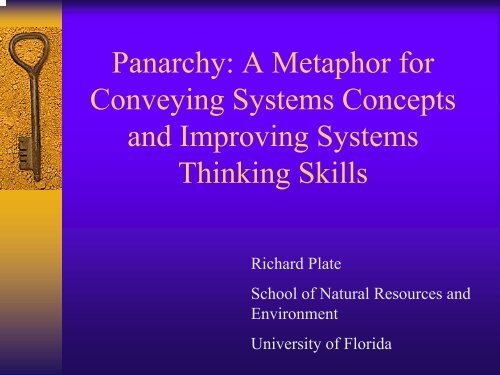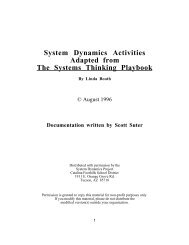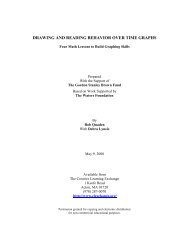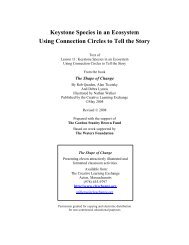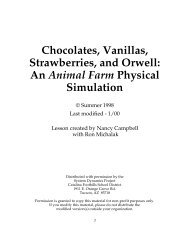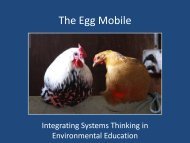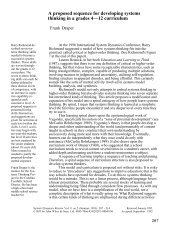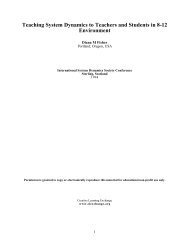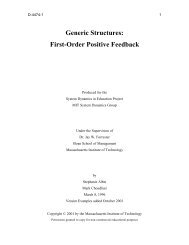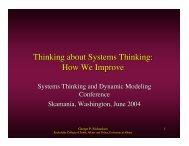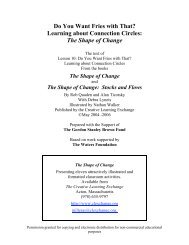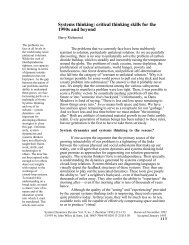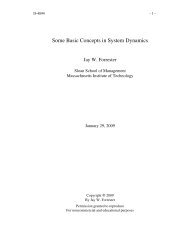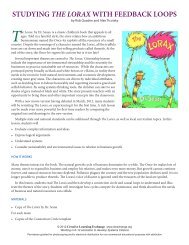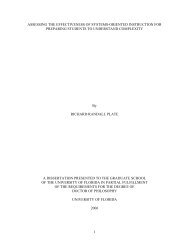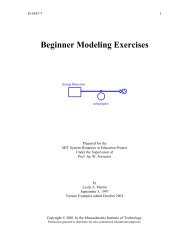Session Handout - Creative Learning Exchange
Session Handout - Creative Learning Exchange
Session Handout - Creative Learning Exchange
Create successful ePaper yourself
Turn your PDF publications into a flip-book with our unique Google optimized e-Paper software.
Panarchy: A Metaphor for<br />
Conveying Systems Concepts<br />
and Improving Systems<br />
Thinking Skills<br />
Richard Plate<br />
School of Natural Resources and<br />
Environment<br />
University of Florida
Richmond’s Seven Thinking Skills<br />
♦ Dynamic Thinking<br />
♦ Systems-as-Cause Thinking<br />
♦ Forest Thinking<br />
♦ Operational Thinking<br />
♦ Closed-Loop Thinking<br />
♦ Quantitative Thinking<br />
♦ Scientific Thinking
Dynamic Thinking<br />
♦ Alternative to Static Thinking<br />
– Focus on events over patterns<br />
– Do not consider that things might get worse<br />
before they get better<br />
♦ Focus on behavior over time<br />
♦ Events result from “the continuous build-up<br />
of pressures within a system”
Systems-as-Cause Thinking<br />
♦ Alternative to Systems-as-Effect Thinking<br />
– View behavior as driven by external forces<br />
– Predict and prepare mentality<br />
♦ Ask the question, “In what ways are we<br />
‘doing it to ourselves?’”<br />
♦ Structure system so that unexpected<br />
perturbations are manageable
Forest Thinking<br />
♦ Alternative to Tree-by-Tree Thinking<br />
– Heavy in details<br />
– Focus on numerical accuracy<br />
♦ View from 10,000 meters<br />
♦ Enables you to connect different parts of the<br />
forest
Operational Thinking<br />
♦ Alternative to Factors thinking<br />
– “Critical Success Factors”<br />
– “Key Drivers”<br />
♦ How is performance being generated?<br />
♦ Concentrating on causality
Closed-Loop Thinking<br />
♦ Alternative to Straight-Line Thinking<br />
– Causality runs only one way<br />
– Each factor is independent of other factors<br />
♦ Factors affect each other<br />
♦ Accounts for feedback within the system
Quantitative Thinking<br />
♦ Alternative to Measurement Thinking<br />
– Knowledge implies precise measurement<br />
– Attempt to get beyond uncertainty<br />
♦ Applying rough numbers to soft variables<br />
(e.g., level of motivation, morale, etc.)<br />
♦ Specifying numerical values for graphing<br />
relationships
Scientific Thinking<br />
♦ Alternative to Proving-Truth Thinking<br />
– Focus on proving models true<br />
– Over-investment in models<br />
♦ “Science proceeds by discarding falsehoods,<br />
not by proving truth.”<br />
♦ Willingness to change models/policies to fit<br />
the situation
Panarchy<br />
♦ Field of Natural Resource Management: Successes<br />
that lead to failure<br />
♦ Panarchy is suggested as a metaphor for<br />
understanding system dynamics.<br />
♦ Caricatures of Nature<br />
Inherently stable—moving naturally toward a balanced<br />
equilibrium<br />
Inherently unstable—slipping inevitably toward total<br />
disorder (entropy)<br />
♦ Pan (Image of unpredictable change) + Hierarchy
Caricatures of Nature: A Closer Look<br />
♦ Nature Flat<br />
♦ Nature Balanced<br />
♦ Nature Anarchic<br />
♦ Nature Resilient<br />
♦ Nature Evolving<br />
Gunderson and Holling 2002
Key Concepts<br />
♦ Change follows a general pattern<br />
♦ Nonlinear behavior are the result of<br />
interactions between large- and small-scale<br />
processes<br />
Gunderson and Holling 2002
Example: Spruce-Fir Forests<br />
♦ Release—Forest fire or pest outbreak<br />
♦ Reorganization—soil processes make<br />
nutrients available for exploitation<br />
♦ Growth and Exploitation—early stages of<br />
ecological succession<br />
♦ Conservation—“climax” community<br />
Gunderson and<br />
Holling 2002
Other Examples<br />
♦ Physical—pile of sand<br />
♦ Historical—rise and fall of governments<br />
and/or civilizations<br />
♦ Literary—progression of characters<br />
♦ Political—elections as a way to manage<br />
release peacefully
Adaptive Cycle—Social Context<br />
Gunderson and Holling 2002
Scale—Natural Context<br />
Gunderson and Holling 2002
Scale—Social Context<br />
Gunderson and Holling 2002
Adaptive Cycle across Scale<br />
Gunderson and Holling 2002
Benefits of Using the Panarchy<br />
Metaphor for Mental Models<br />
♦ Dynamic Thinking:<br />
– events are viewed as part of an ongoing cycle of growth<br />
and change<br />
– continuous build-up and release of pressure within a<br />
system<br />
♦ Systems-as-Cause Thinking:<br />
– system behavior caused by interactions between fast<br />
and slow variables<br />
– system creates conditions for its own release period<br />
♦ Forest Thinking:<br />
– temporal scales extended to view entire cycles<br />
– look at more than one variable and more than one scale
Benefits of Using the Panarchy<br />
Metaphor for Mental Models<br />
♦ Closed-Loop Thinking:<br />
– feedbacks become critical to understanding<br />
system behavior<br />
– Small-scale processes feedback and dominate<br />
during back-loop periods of release.<br />
♦ Scientific Thinking:<br />
– models and policies must change to fit the<br />
situation<br />
– Constantly reassess to see where the<br />
model/policy does not fit the system
Sample Assignments<br />
♦ <strong>Learning</strong> Panarchy<br />
– Evolution of a musical artist/group<br />
♦ Using Panarchy<br />
– Evolution of a political movement (Civil Rights,<br />
Women’s Rights, Environmental)<br />
♦ Key Tasks and Questions<br />
– Identify and describe the stages of at least two adaptive<br />
cycles for your system.<br />
– Identify slow processes vs. fast processes and describe<br />
key interactions<br />
– What have occurred from one cycle to the next?<br />
– What has remained constant from cycle to cycle?
Closing Comments<br />
♦ “As you gain ability and confidence [with systems<br />
thinking skills], you’ll find that you’ll begin to see<br />
the world in new, more dynamic and holistic<br />
ways—which is really the most powerful<br />
advantage that systems thinking offers”<br />
(Richmond 2000).<br />
♦ “The challenge…is to conserve the ability to<br />
adapt to change, to be able to respond in a flexible<br />
way to uncertainty and surprises. And even to<br />
create the kind of surprises that open opportunity”<br />
(Gunderson and Holling 2002).
The End<br />
Acknowledgements<br />
♦ <strong>Creative</strong> <strong>Learning</strong> <strong>Exchange</strong><br />
♦ University of Florida Student Government


